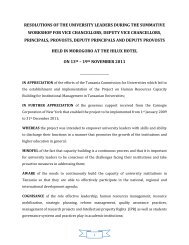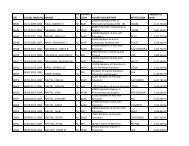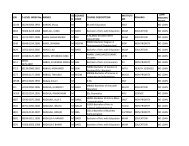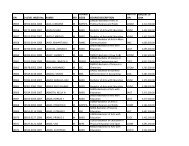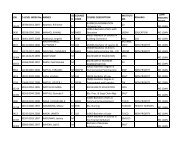Handbook for Quality Assurance in Higher Education The ... - TCU
Handbook for Quality Assurance in Higher Education The ... - TCU
Handbook for Quality Assurance in Higher Education The ... - TCU
Create successful ePaper yourself
Turn your PDF publications into a flip-book with our unique Google optimized e-Paper software.
SECTION 1: <strong>Quality</strong> <strong>in</strong> <strong>Higher</strong> <strong>Education</strong><br />
<strong>The</strong> word quality is often used without expla<strong>in</strong><strong>in</strong>g what quality is. However, everybody who<br />
th<strong>in</strong>ks about quality and quality assurance is faced with the question:<br />
“What is quality?” When talk<strong>in</strong>g about quality and quality assurance, it is important to speak<br />
the same language. We must understand each other and we must have a shared idea about<br />
quality. In this chapter, some general ideas about quality and quality assurance will be expla<strong>in</strong>ed.<br />
1.1 What is quality?<br />
Many discussions on quality start with a quote from the book “Zen and the Art of Motorcycle<br />
Ma<strong>in</strong>tenance”:<br />
“<strong>Quality</strong>...you know what it is, yet you don’t know what it is. But that’s self-contradictory. But<br />
some th<strong>in</strong>gs are better than others, that is, they have more quality. But when you try to say<br />
what the quality is, apart from the th<strong>in</strong>gs that have it, it all goes poof! <strong>The</strong>re’s noth<strong>in</strong>g to talk<br />
about. But if you can’t say what <strong>Quality</strong> is, how do we know what it is, or how do you know<br />
that it even exists? If no one knows what it is, then <strong>for</strong> all practical purposes, it doesn’t exist at<br />
all. But <strong>for</strong> practical purposes it really does exist. What else are the grades based on? Why<br />
else would people pay <strong>for</strong>tunes <strong>for</strong> some th<strong>in</strong>gs and throw others <strong>in</strong> the trash pile? Obviously<br />
some th<strong>in</strong>gs are better than others... but what’s the ‘betterness’? So round and round you go,<br />
sp<strong>in</strong>n<strong>in</strong>g mental wheels and nowhere f<strong>in</strong>d<strong>in</strong>g any place to get traction. What the hell is<br />
<strong>Quality</strong>? What is it?”<br />
In spite of these reflections by Pirsig, many books and articles have been written to try to describe<br />
the nature of quality. But quality is like love. Everybody talks about it and everybody<br />
knows what he/she is talk<strong>in</strong>g about. Everybody knows and feels when there is love. Everybody<br />
recognises it, but when we try to def<strong>in</strong>e it we are left stand<strong>in</strong>g empty-handed. <strong>The</strong> same<br />
counts <strong>for</strong> the concept of quality. <strong>The</strong>re is no general consensus on the concept of quality. An<br />
absolute def<strong>in</strong>ition of quality does not exist because just like beauty quality is <strong>in</strong> the eyes of<br />
the beholder.<br />
While the general concept of quality is a difficult one <strong>in</strong> itself, quality <strong>in</strong> higher education is<br />
much more complex, because it is not always clear what the “product” is and who the<br />
“client” is. Is the “graduate” the “product” that we offer society and the labour market? or is<br />
the graduate-to-be, the student, our “client” and the program that we offer the “product”? We<br />
can only say that a university has a multiple product system and a multi-client system.<br />
Guidel<strong>in</strong>es <strong>for</strong> Self Assessment<br />
3<br />
IUCEA/ CHE/ NCHE/ <strong>TCU</strong>/ DAAD



